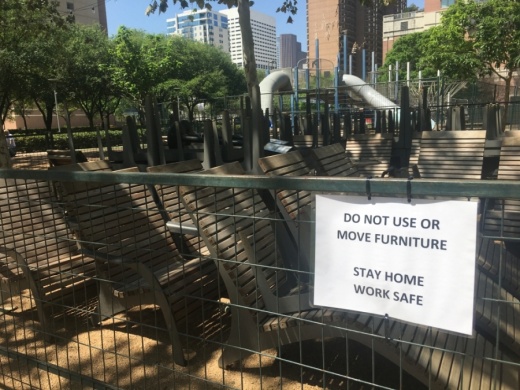In a joint announcement, Harris County Judge Lina Hidalgo and Houston Mayor Sylvester Turner said the extension of the "Stay Home-Work Safe" order comes with unanimous approval from the CEOs from the hospitals in the Houston Medical Center.
"It is not the time right now to scale back in our containment measures," Hidalgo said. "If anything, it’s time to double down. We’ve not yet gotten to the point of flattening the curve. Our road map back to normalcy begins with the extension of our Stay Home-Work Safe order."
The number of confirmed COVID-19 cases in Harris County, including the city of Houston, has increased from 134 on March 24—a week ago—to 631 on March 31. Turner said there are likely many more people who have been infected who are not included in that count due to testing limitations.
The Harris County announcement comes on the heels of a similar announcement by Texas Gov. Greg Abbott, who issued a statewide executive order through April 30 limiting Texas to essential travel and activities.
Dr. Paul Klotman, president and CEO of the Baylor College of Medicine, said proper social distancing could make a difference of four weeks in terms of when the pandemic could peak in Harris County and in whether local hospitals are overwhelmed with cases. If social distancing is successful, the peak could come around early May, he said.
Releasing nonviolent inmates
Hidalgo also announced she is preparing to sign an order that will temporarily release certain nonviolent inmates from the Harris County Jail for however long the county's disaster declaration is in place.
Hidalgo described the situation in the jail, where roughly 8,000 inmates live in close quarters, as a "ticking time bomb." Around 3,000 county staff and contractors are still going in and out of the jail on a regular basis, increasing the chances for potential infection to spread outside of the jail, she said.
"Public health experts have made clear that it’s a dangerous situation," she said. "The cramped conditions there make it virtually impossible to enforce social distancing [and] proper quarantining of sick people."
The released inmates will not include those who have already been convicted of a crime. Exceptions for who will be released include any inmate who has a record of violent crime or making violent threats, anyone who was arrested for burglarizing a residence and anyone who has three or more DWI charges, Hidalgo said.
Before release, each inmate will go through a process that will involve appearing before sheriff pretrial services and a group of criminal justice stakeholders, who will review each person to ensure they do not have a violent history and that they will not released into homelessness, Hidalgo said. The county will also make use of ankle monitors to ensure that released individuals come back to court and of breathalyzers to make sure anyone arrested for DWIs cannot drive drunk while on release.
As many as 1,000 inmates could be released, Hidalgo estimated.
"Those being released are not being absolved of their alleged nonviolent crimes," she said. "Those who are committed who have been found guilty will still face justice and time if necessary."





